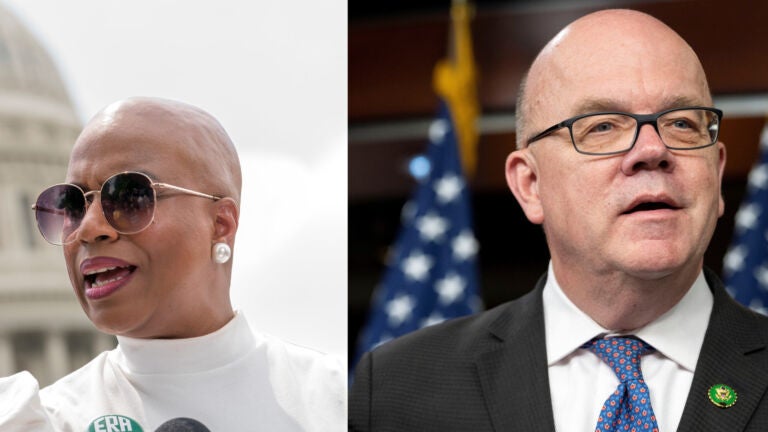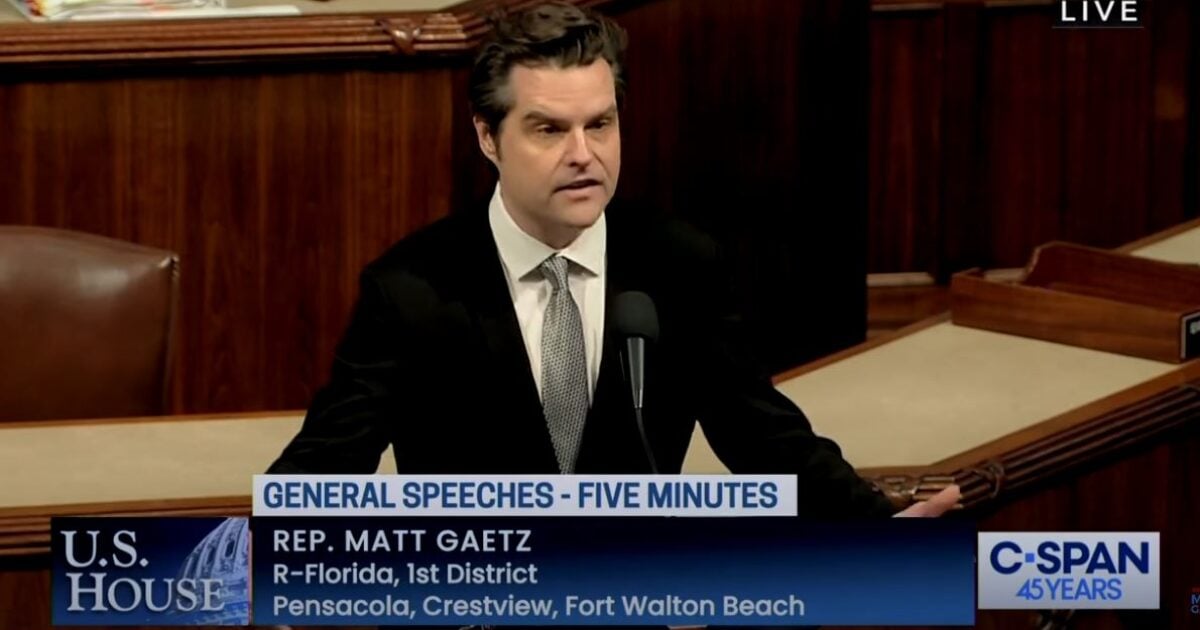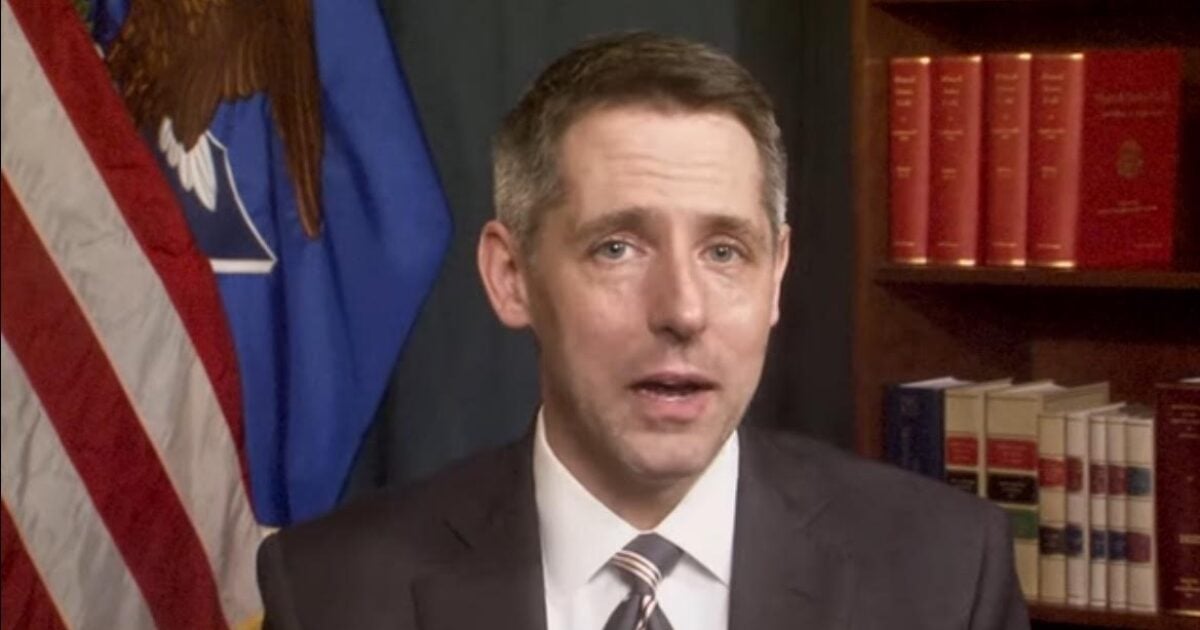Skip to Main Content
Politics
“No deal should ever compromise the needs of the most vulnerable in our society,” Rep. Jim McGovern said in a tweet.

Hoping to stave off a potential default, a bipartisan coalition of representatives Wednesday night voted to pass legislation that suspends the debt ceiling in a 314-117 vote. The legislation slashes funding for various federal programs but maintains spending in others, isolating both progressive Democrats and right-wing Republicans.
Of the nine Massachusetts representatives, seven voted to pass the legislation and two voted against it, Reps. Ayanna Pressley and Jim McGovern.
After weeks of private negotiations, President Joe Biden and Speaker Kevin McCarthy announced a deal that would suspend the $31.4 trillion federal debt ceiling for two years while cutting $1.5 trillion over the next decade. Several conservative Republicans felt McCarthy should have pushed for greater spending cuts, so much so that more GOP representatives voted against the bill than Democrats.
Throughout negotiations, Democrats continued to call out the GOP for holding federal programs hostage. But without the Republican votes needed to approve the bill, a bloc of moderate Democrats ultimately provided enough support to pass the legislation through the House, deciding that spending cuts, albeit imperfect, were preferable to a federal default.
Massachusetts Reps. Jake Auchincloss, Katherine Clark, Bill Keating, Stephen Lynch, Seth Moulton, Richard Neal, and Lori Trahan voted for the legislation — with most stating the compromise was necessary to avoid a catastrophic default.
The no’s
But two Massachusetts representatives disagreed. Pressley and McGovern both voted against the deal, stating the limitations placed onto federal food security programs, the end of the federal student loan pause, and energy permit reforms were too far.
“No deal should ever compromise the needs of the most vulnerable in our society,” McGovern said in a tweet. “I’m grateful for President Biden’s efforts to protect so many—but, for me, there are too many still left unprotected.”
No deal should ever compromise the needs of the most vulnerable in our society. I’m grateful for President Biden’s efforts to protect so many—but, for me, there are too many still left unprotected.
— Rep. Jim McGovern (@RepMcGovern) June 1, 2023
Pressley echoed McGovern’s remarks, arguing against the slashing of federal programs, while cutting IRS spending — which could ultimately help lower the national debt — and maintaining a “bloated defense budget.”
“While I have consistently reported raising the debt ceiling, I could not in good conscience support a bill that takes food away from hungry people, forces borrowers back into our broken student loan system, and perpetuates environmental injustice — while leaving the bloated defense budget intact and making it easier for the ultra wealthy to avoid paying their fair share in taxes,” she wrote in a Facebook statement.
SNAP benefits
Throughout negotiations, McGovern, ranking member on the House Rules Committee, continued to push Democrats — and Biden — away from placing work requirements on Supplemental Nutrition Assistance Program, or SNAP, benefits. But despite McGovern’s and several other representatives’ concerns, the final deal creates additional work requirements for food stamps and includes restrictions assistance for low-income families, blindsiding food advocates.
Specifically, the deal expands work requirements from the 18-49 age bracket to adults up to 52 years old without children by 2025 and 54 years old without children until 2030. The legislation also includes additional restrictions on Temporary Assistance for Needy Families emergency cash, specially impacting low-income families.
“I just have a hard time voting for something that compromises support for some of the most vulnerable people that I represent,” McGovern told Politico. “I’m grateful to the president for fighting the good fight. And he was able to reverse a lot of bad things. But we need to do better in the future.”
While the deal would create new obstacles for those facing food insecurity, it also provides new exemptions for unhoused people, veterans, and people recently aged out of foster homes. And according to a Tuesday report from the Congressional Budget Office, 78,000 additional people could receive SNAP benefits in an average month under the deal, and federal spending on the program would increase $2.1 billion from 2023 to 2033.
“First, on its own, expanding the work requirement to adults up to the age of 52 in 2024 and up to age 54 over the 2025–2030 period would reduce spending for SNAP by $6.5 billion over the 2023–2033 period,” the CBO wrote. “Second, on its own, the exclusion of several groups would lead to a spending increase of $6.8 billion over the same period.”
Student loan forgiveness
Another sticking point for progressives like Pressley is the ending of the pause on student loan payments. The debt ceiling bill would force students to resume payments starting this fall and would prohibit the secretary of education from using “any authority to implement an extension” of student loan forgiveness.
For years, Biden has worked to implement his student loan forgiveness plan — a cancellation of $20,000 per borrower — and something he promised early in his campaign for president.
The plan has continually faced legal — and political — challenges but has been extended eight times, and now awaits a Supreme Court ruling. With the passing of the debt ceiling bill, the pause on payments and interest would end “sixty days after June 30, 2023.”
But according to a White House spokesperson, payments were expected to resume this fall, regardless of the spending bill.
“President Biden protected the student debt relief plan in its entirety,” White House spokesperson Abdullah Hasan said in a statement to Politico. “The Administration announced back in November that the current student loan payment pause would end this summer — this agreement makes no changes to that plan.”
The proposal prohibits the secretary of education from using “any authority to implement an extension” of student loan forgiveness unless “expressly authorized” by Congress, squashing any hope the roughly 45 million borrowers might have had of a ninth extension.
Pressley introduced an amendment that would have removed the pause’s end date and allow the secretary of education to issue an extension, but the bill made it through the House without its addition.
“The student loan payment pause has been an essential lifeline for workers and families struggling to make ends meet,” Rep. Pressley said in a statement. “My amendment would protect student borrowers while also affirming the President’s clear legal authority to implement payment pauses, broad-based debt cancellation, and other critical relief measures. Republicans continue to play games with our economy, with disregard for our most vulnerable families.”
Environmental rollbacks
The debt ceiling bill also includes two environment-related provisions, one of which ensures the construction of a natural gas pipeline and the other would hasten the time frame on projects’ environmental assessments.
The legislation deems the Mountain Valley Pipeline — a controversial 303-mile $6.6 billion natural gas pipeline — in the national interest and would expedite its construction through several legal challenges.
The pipeline travels from across West Virginia into Virginia and crosses 1,000 streams and wetlands. It has seen support from West Virginia representatives, including key Democratic swing vote Joe Manchin. Environmental activists have continued to challenge the pipeline’s water permits, but the draft would make certain its completion.
Additionally, the bill also amends the National Environmental Policy Act, or NEPA, which requires federal agencies to weigh the environmental impacts of projects.
The bill places a one-year and 150-page limit on most project reviews and a two-year and 300-page limit on projects consequentially impactful to the environment. Environmental advocates argue this will hinder the environmental review process.
“Republicans got exactly what they wanted,” Jean Su, energy justice program director at the Center for Biological Diversity, told the Associated Press. “There is a severe rollback of our environmental reviews.”
And for Pressley — who said the bill “perpetuates environmental injustice” — the rollbacks were enough to constitute a “no” vote.
To the Senate
Now, the bill heads to the Senate, where both Massachusetts senators have expressed hesitancy, and even refusal, to vote for the legislation.
Sen. Ed Markey, citing the environmental rollbacks, said he will not be supporting the bill.
Republicans racked up trillions in debt under Trump and would now rather deprive struggling families of food and financial security than ask the wealthy to pay their fair share in taxes.
— Ed Markey (@SenMarkey) May 31, 2023
And Sen. Elizabeth Warren has expressed skepticism toward the legislation.
“We have to weigh the consequences of default against the pain that Republicans are trying to impose on hungry Americans, students, our climate and the Republicans’ constant enthusiasm for protecting billionaire tax cheats,” she told Politico.
Newsletter Signup
Stay up to date on all the latest news from Boston.com
![]()










